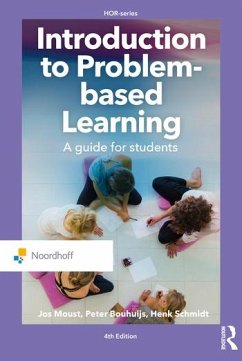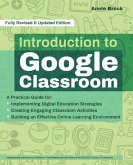- Broschiertes Buch
- Merkliste
- Auf die Merkliste
- Bewerten Bewerten
- Teilen
- Produkt teilen
- Produkterinnerung
- Produkterinnerung
Introduction to Problem-based Learning teaches students how to work with the problem-based learning method, which requires mainly self-directed learning
Andere Kunden interessierten sich auch für
![Ten Steps to Complex Learning Ten Steps to Complex Learning]() Jeroen J. G. van Merrienboer (The Netherland Maastricht UniversityTen Steps to Complex Learning54,99 €
Jeroen J. G. van Merrienboer (The Netherland Maastricht UniversityTen Steps to Complex Learning54,99 €![A Basic Guide to International Business Law A Basic Guide to International Business Law]() Harm WeversA Basic Guide to International Business Law74,99 €
Harm WeversA Basic Guide to International Business Law74,99 €![Project Management Project Management]() Roel GritProject Management63,99 €
Roel GritProject Management63,99 €![The Basics of Financial Management The Basics of Financial Management]() Peter de BoerThe Basics of Financial Management83,99 €
Peter de BoerThe Basics of Financial Management83,99 €![Rethinking Problem-based Learning for the Digital Age Rethinking Problem-based Learning for the Digital Age]() Maggi Savin-BadenRethinking Problem-based Learning for the Digital Age39,99 €
Maggi Savin-BadenRethinking Problem-based Learning for the Digital Age39,99 €![Blended Learning Solutions in Higher Education Blended Learning Solutions in Higher Education]() Neil HughesBlended Learning Solutions in Higher Education38,99 €
Neil HughesBlended Learning Solutions in Higher Education38,99 €![Introduction to Google Classroom: A Practical Guide for Implementing Digital Education Strategies, Creating Engaging Classroom Activities, and Buildin Introduction to Google Classroom: A Practical Guide for Implementing Digital Education Strategies, Creating Engaging Classroom Activities, and Buildin]() Annie BrockIntroduction to Google Classroom: A Practical Guide for Implementing Digital Education Strategies, Creating Engaging Classroom Activities, and Buildin18,99 €
Annie BrockIntroduction to Google Classroom: A Practical Guide for Implementing Digital Education Strategies, Creating Engaging Classroom Activities, and Buildin18,99 €-
-
-
Introduction to Problem-based Learning teaches students how to work with the problem-based learning method, which requires mainly self-directed learning
Hinweis: Dieser Artikel kann nur an eine deutsche Lieferadresse ausgeliefert werden.
Hinweis: Dieser Artikel kann nur an eine deutsche Lieferadresse ausgeliefert werden.
Produktdetails
- Produktdetails
- Routledge-Noordhoff International Editions
- Verlag: Wolters-Noordhoff B.V.
- 4 ed
- Seitenzahl: 134
- Erscheinungstermin: 27. Mai 2021
- Englisch
- Abmessung: 168mm x 238mm x 12mm
- Gewicht: 270g
- ISBN-13: 9789001877866
- ISBN-10: 9001877869
- Artikelnr.: 62005451
- Herstellerkennzeichnung
- Libri GmbH
- Europaallee 1
- 36244 Bad Hersfeld
- gpsr@libri.de
- Routledge-Noordhoff International Editions
- Verlag: Wolters-Noordhoff B.V.
- 4 ed
- Seitenzahl: 134
- Erscheinungstermin: 27. Mai 2021
- Englisch
- Abmessung: 168mm x 238mm x 12mm
- Gewicht: 270g
- ISBN-13: 9789001877866
- ISBN-10: 9001877869
- Artikelnr.: 62005451
- Herstellerkennzeichnung
- Libri GmbH
- Europaallee 1
- 36244 Bad Hersfeld
- gpsr@libri.de
Jos Moust Peter Bouhuijs Henk Schmidt
1 Features of Problem-based Learning
1.1 Introduction
1.2 What is learning about?
1.3 Learning from and with each other
1.4 What do we know about the effectiveness of problem-based
learning?
1.5 Problem-based learning in an electronic environment
1.6 Skills in problem-based learning
2 Learning through problems
2.1 Introduction
2.2 Various types of problems for problem-based learning
2.3 Explanation problems
2.4 The seven-step method of working with explanation
problems
2.5 Strategy problems
2.6 Dilemma problems
2.7 Other types of problems
2.8 Variations in problem-based learning
2.9 Educational approaches related to problem-based learning
3 Collaborative learning in the tutorial group
3.1 Introduction
3.2 What is a tutorial group?
3.3 The importance of learning in small groups
3.4 Collaborative learning in a tutorial group
3.5 Some elementary characteristics of communication
3.6 Informal roles played out in the tutorial group
3.7 Formal roles played out in the tutorial group
4 Individual study skills
4.1 Introduction
4.2 Selecting learning resources
4.3 Studying texts
4.4 Making notes and diagrams
4.5 Studying texts in a foreign language
4.6 Recording your studies
4.7 Time management
4.8 Exams, finals and course assessment
4.9 Learning issues
4.10 Learning to learn
5 Skills required by tutorial group members
5.1 Introduction
5.2 The first meeting in a module
5.3 Providing and requesting information
5.4 Active listening
5.5 Making summaries
5.6 Taking notes
5.7 Evaluating tutorial group meetings
5.8 Giving and receiving feedback
Appendix: Tools to improve your skills as a tutorial group
member
1 Observation list: 'Being a tutorial group member'
2 A questionnaire for evaluating processes in tutorial
groups
3 Checklist: 'Skills of a tutorial group member'
6 Chairing a tutorial group meeting
6.1 Introduction
6.2 Taking turns
6.3 Some general points
6.4 The role of the discussion leader during the synthesis
phase
6.5 The role of the discussion leader during the analysis
phase
6.6 Stimulating a collaborative working atmosphere
6.7 Some final points
Appendix: Tools to improve your skills as a discussion
leader
1 Observation form 'Discussion leader functioning in the
synthesis phase'
2 Observation form 'Discussion leader functioning in the
analysis phase'
3 Checklist: Discussion leader skills
4 PROfessional Functioning in Teams (PROFiT)
Notes
Recommended literature
References
Index
1.1 Introduction
1.2 What is learning about?
1.3 Learning from and with each other
1.4 What do we know about the effectiveness of problem-based
learning?
1.5 Problem-based learning in an electronic environment
1.6 Skills in problem-based learning
2 Learning through problems
2.1 Introduction
2.2 Various types of problems for problem-based learning
2.3 Explanation problems
2.4 The seven-step method of working with explanation
problems
2.5 Strategy problems
2.6 Dilemma problems
2.7 Other types of problems
2.8 Variations in problem-based learning
2.9 Educational approaches related to problem-based learning
3 Collaborative learning in the tutorial group
3.1 Introduction
3.2 What is a tutorial group?
3.3 The importance of learning in small groups
3.4 Collaborative learning in a tutorial group
3.5 Some elementary characteristics of communication
3.6 Informal roles played out in the tutorial group
3.7 Formal roles played out in the tutorial group
4 Individual study skills
4.1 Introduction
4.2 Selecting learning resources
4.3 Studying texts
4.4 Making notes and diagrams
4.5 Studying texts in a foreign language
4.6 Recording your studies
4.7 Time management
4.8 Exams, finals and course assessment
4.9 Learning issues
4.10 Learning to learn
5 Skills required by tutorial group members
5.1 Introduction
5.2 The first meeting in a module
5.3 Providing and requesting information
5.4 Active listening
5.5 Making summaries
5.6 Taking notes
5.7 Evaluating tutorial group meetings
5.8 Giving and receiving feedback
Appendix: Tools to improve your skills as a tutorial group
member
1 Observation list: 'Being a tutorial group member'
2 A questionnaire for evaluating processes in tutorial
groups
3 Checklist: 'Skills of a tutorial group member'
6 Chairing a tutorial group meeting
6.1 Introduction
6.2 Taking turns
6.3 Some general points
6.4 The role of the discussion leader during the synthesis
phase
6.5 The role of the discussion leader during the analysis
phase
6.6 Stimulating a collaborative working atmosphere
6.7 Some final points
Appendix: Tools to improve your skills as a discussion
leader
1 Observation form 'Discussion leader functioning in the
synthesis phase'
2 Observation form 'Discussion leader functioning in the
analysis phase'
3 Checklist: Discussion leader skills
4 PROfessional Functioning in Teams (PROFiT)
Notes
Recommended literature
References
Index
1 Features of Problem-based Learning
1.1 Introduction
1.2 What is learning about?
1.3 Learning from and with each other
1.4 What do we know about the effectiveness of problem-based
learning?
1.5 Problem-based learning in an electronic environment
1.6 Skills in problem-based learning
2 Learning through problems
2.1 Introduction
2.2 Various types of problems for problem-based learning
2.3 Explanation problems
2.4 The seven-step method of working with explanation
problems
2.5 Strategy problems
2.6 Dilemma problems
2.7 Other types of problems
2.8 Variations in problem-based learning
2.9 Educational approaches related to problem-based learning
3 Collaborative learning in the tutorial group
3.1 Introduction
3.2 What is a tutorial group?
3.3 The importance of learning in small groups
3.4 Collaborative learning in a tutorial group
3.5 Some elementary characteristics of communication
3.6 Informal roles played out in the tutorial group
3.7 Formal roles played out in the tutorial group
4 Individual study skills
4.1 Introduction
4.2 Selecting learning resources
4.3 Studying texts
4.4 Making notes and diagrams
4.5 Studying texts in a foreign language
4.6 Recording your studies
4.7 Time management
4.8 Exams, finals and course assessment
4.9 Learning issues
4.10 Learning to learn
5 Skills required by tutorial group members
5.1 Introduction
5.2 The first meeting in a module
5.3 Providing and requesting information
5.4 Active listening
5.5 Making summaries
5.6 Taking notes
5.7 Evaluating tutorial group meetings
5.8 Giving and receiving feedback
Appendix: Tools to improve your skills as a tutorial group
member
1 Observation list: 'Being a tutorial group member'
2 A questionnaire for evaluating processes in tutorial
groups
3 Checklist: 'Skills of a tutorial group member'
6 Chairing a tutorial group meeting
6.1 Introduction
6.2 Taking turns
6.3 Some general points
6.4 The role of the discussion leader during the synthesis
phase
6.5 The role of the discussion leader during the analysis
phase
6.6 Stimulating a collaborative working atmosphere
6.7 Some final points
Appendix: Tools to improve your skills as a discussion
leader
1 Observation form 'Discussion leader functioning in the
synthesis phase'
2 Observation form 'Discussion leader functioning in the
analysis phase'
3 Checklist: Discussion leader skills
4 PROfessional Functioning in Teams (PROFiT)
Notes
Recommended literature
References
Index
1.1 Introduction
1.2 What is learning about?
1.3 Learning from and with each other
1.4 What do we know about the effectiveness of problem-based
learning?
1.5 Problem-based learning in an electronic environment
1.6 Skills in problem-based learning
2 Learning through problems
2.1 Introduction
2.2 Various types of problems for problem-based learning
2.3 Explanation problems
2.4 The seven-step method of working with explanation
problems
2.5 Strategy problems
2.6 Dilemma problems
2.7 Other types of problems
2.8 Variations in problem-based learning
2.9 Educational approaches related to problem-based learning
3 Collaborative learning in the tutorial group
3.1 Introduction
3.2 What is a tutorial group?
3.3 The importance of learning in small groups
3.4 Collaborative learning in a tutorial group
3.5 Some elementary characteristics of communication
3.6 Informal roles played out in the tutorial group
3.7 Formal roles played out in the tutorial group
4 Individual study skills
4.1 Introduction
4.2 Selecting learning resources
4.3 Studying texts
4.4 Making notes and diagrams
4.5 Studying texts in a foreign language
4.6 Recording your studies
4.7 Time management
4.8 Exams, finals and course assessment
4.9 Learning issues
4.10 Learning to learn
5 Skills required by tutorial group members
5.1 Introduction
5.2 The first meeting in a module
5.3 Providing and requesting information
5.4 Active listening
5.5 Making summaries
5.6 Taking notes
5.7 Evaluating tutorial group meetings
5.8 Giving and receiving feedback
Appendix: Tools to improve your skills as a tutorial group
member
1 Observation list: 'Being a tutorial group member'
2 A questionnaire for evaluating processes in tutorial
groups
3 Checklist: 'Skills of a tutorial group member'
6 Chairing a tutorial group meeting
6.1 Introduction
6.2 Taking turns
6.3 Some general points
6.4 The role of the discussion leader during the synthesis
phase
6.5 The role of the discussion leader during the analysis
phase
6.6 Stimulating a collaborative working atmosphere
6.7 Some final points
Appendix: Tools to improve your skills as a discussion
leader
1 Observation form 'Discussion leader functioning in the
synthesis phase'
2 Observation form 'Discussion leader functioning in the
analysis phase'
3 Checklist: Discussion leader skills
4 PROfessional Functioning in Teams (PROFiT)
Notes
Recommended literature
References
Index








